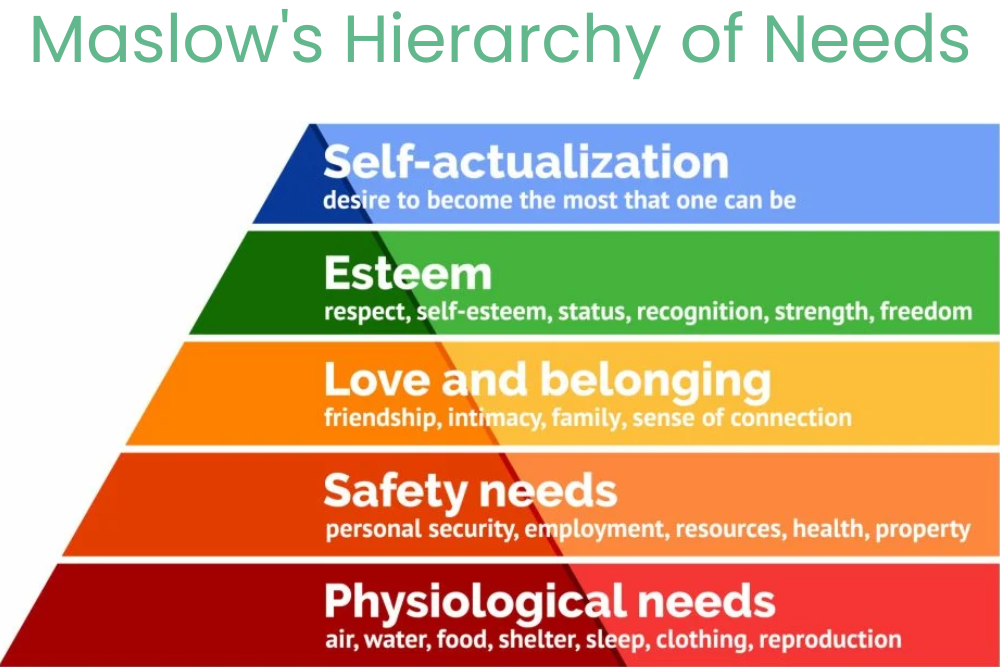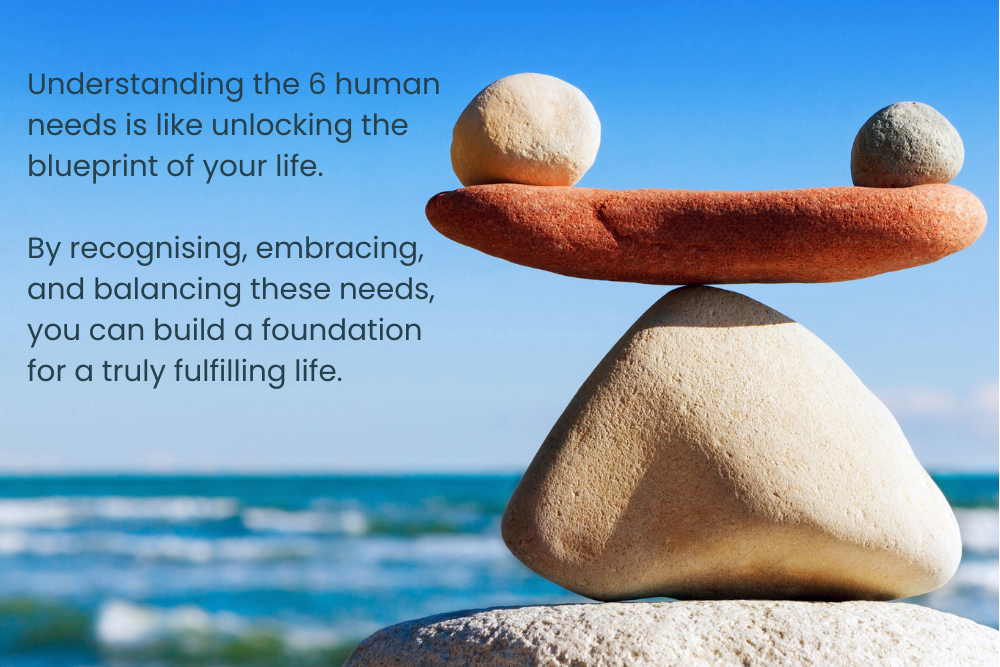- Article
- prev
- next
- Bookmark Article
- Share Article
- prev
- next
Attribution Details
Article: The 6 Human Needs: Harnessing Their Power For A Fulfilling Life
Written By: Libby Hogan, Coach Connect Australia
Article Content
The 6 Human Needs: Harnessing Their Power For A Fulfilling Life
The concept of the six human needs is a powerful framework for understanding what motivates and drives human behaviour. Developed by Tony Robbins, a distinguished life coach and self-help author, these six needs have provided valuable insights into the realm of personal development.
They are at the core of understanding why we make the choices we do, and how we can create a more fulfilling life.
A Brief History of the 6 Human Needs & Maslow's Hierarchy of Needs
The origins of the 6 human needs can be traced back to Abraham Maslow's Hierarchy of Needs. Abraham Maslow, a psychologist, introduced a hierarchical model of human needs in the mid-20th century.
His pyramid depicted the basic human needs of physiological and safety needs (ie food water, security) at the base, followed by the psychological needs of love and belonging, self esteem, and finally, the self fulfillment needs of self-actualization at the top.

While Maslow's theory laid the foundation for understanding human needs, Tony Robbins took it a step further...
Tony Robbins recognised that human needs are not hierarchical in nature, as Maslow's hierarchy of needs suggested, but rather overlapping and dynamic. He built upon Maslow's work by developing the 6 human needs, offering a more practical, better understanding of the driving force behind human behaviour.
The 6 human needs include:
- Certainty: The need for security of comfort. It's our desire to avoid pain and gain pleasure via stability and predictability in life.
- Uncertainty/Variety: The craving for the unknown, change, and new stimuli. It fuels our desire for adventure and excitement.
- Significance: The need to feel unique, important, special, or needed. It's the drive to stand out, be recognised, and leave a mark on the world.
- Connection/Love: A deep desire for closeness and union with someone or something. This need embodies our longing for companionship, love, and meaningful relationships.
- Growth: The aspiration to expand our capacity, capability, and understanding. It's the drive for continuous self-improvement and learning.
- Contribution: The desire for a sense of service, focusing on helping, giving to, and supporting others. This need reflects our innate urge to make a positive impact on the world.
Robbins' model provides a more comprehensive framework for personal growth and offers deeper insights into human motivation, behaviour, and decision-making.
In the world of life coaching and personal development, the six human needs have become a fundamental tool for helping individuals understand themselves and others, leading to greater self-awareness, personal growth, and improved relationships.
By recognising and balancing these needs, individuals can navigate the complex landscape of human desires and achieve a more harmonious and fulfilling life.

Exploring the 6 Human Needs
In the realm of personal development, the concept of the 6 human needs is a profound and practical framework for understanding behaviour, motivation and personal growth.
Let's delve into each human need and how they manifest in our lives.
1. Certainty: Your Comfort Zone Unveiled
At a basic level, each of us has a need to satisfy a sense of stability. It's the desire for predictability and a sense of security. Certainty is what ensures that your paycheck arrives as expected, your car starts when you turn the key, and you can count on the sun rising each morning.
In everyday life, certainty is reflected in our preference for routines. Consider the person who cherishes their daily routine, from the morning coffee that tastes the same each day to the stability of a 9-to-5 job, offering a predictable income and a comforting sense of security.
2. Embracing Uncertainty: The Thrilling Side of the 6 Human Needs
Uncertainty, or variety, is the need for the unknown, constant change, and new stimuli. It's the element that makes life exciting and unpredictable, providing the spice of variety. This need propels us to explore, experience new things, and seek adventure.
The pursuit of uncertainty can be seen in the adventurous traveller who frequently explores new countries, tries new foods, and actively seeks out novel experiences. All in the quest for excitement and the unknown.
3. Significance: Finding Your Unique Place in the World
Significance is the need to feel unique, important, special, or needed. It's the drive to stand out, be recognised, and leave a lasting impression on the world. This need becomes apparent when we seek recognition or validation for our achievements.
In our interconnected world, the pursuit of significance is often seen on social media platforms, where individuals continually seek recognition, accumulating likes, comments, and shares to validate their worth and unique place in the digital space.

4. Connection and Love: Nurturing Your Deepest Human Desires
Connection and love are about forming deep, meaningful relationships and involves feelings of experiencing love and closeness. This need underpins our connections with family, friends, and romantic partners, bringing us warmth and companionship.
In the sphere of relationships, the need for connection and love is evident in the profound bond between parent and child, the joy of sharing life with a partner, and the camaraderie and trust among close friends. All of which satisfy our innate need for closeness and affection.
5. Growth: The Fuel for an Expansive Life
Growth is the need for self-improvement, learning, and personal development. It's what motivates us to take on new challenges, acquire new skills, and strive to achieve our self-actualization needs.
Individuals pursuing growth needs might decide to learn a new language, further their education, or embark on a journey of personal growth through self-help books and courses. All are driven by the desire to expand their horizons and continually improve themselves.
6. Contribution: The Path to Self Fulfillment
The sixth human need for contribution revolves around service, giving back, and supporting others. It's the fulfilment that comes from helping and making a positive impact on the world, whether on a small or grand scale.
Contribution takes shape in acts of kindness, from volunteering at a local charity to mentoring someone in need or simply offering assistance to a friend in a time of crisis. It's the profound sense of purpose and fulfilment that arises from supporting others.

Why Understanding the 6 Human Needs is a Game-Changer
Unlocking the profound significance of the six human needs can be a true game-changer on your journey of personal growth and self-awareness.
By delving into the intricacies of these core needs, you can equip yourself with a powerful tool that allows you to navigate life with a deeper understanding of both yourself and those in your sphere of influence.
Personal Growth and Self-Awareness
The foundation of personal growth is the recognition and acknowledgment of these fundamental core needs. It is the first step towards achieving a higher level of self-awareness. When you understand that your actions, choices, and desires are often driven by these needs, you gain insight into your motivations.
This self-awareness can be transformative. It allows you to make informed decisions, paving the way for a life that aligns more closely with your values and aspirations.
Let's consider an example: John, a hardworking professional, recognises that his relentless pursuit of career success, fueled by the need for significance, is leaving him feeling unfulfilled in other areas of life. With this newfound awareness, John can choose to balance his need for significance with a greater focus on connection and love. By nurturing his relationships and prioritising quality time with loved ones, he can lead a more satisfying and holistic life.
Enhanced Relationships
In the realm of interpersonal relationships, understanding these needs can be a game-changer as well.
When you appreciate that everyone you come across, from friends and family to colleagues, is driven by their own unique blend of these needs, it becomes easier to empathise and connect on a deeper level.
You can tailor your interactions to better meet the core needs of others, leading to more fulfilling and harmonious relationships.
For instance, consider Sarah, a friend who values variety and uncertainty. She often seeks out new experiences and craves spontaneity. Understanding her need for variety, you can delight her with a surprise adventure or support her in pursuing her interests, thus strengthening your connection with her.

Understanding Human Behavior
These 6 human needs offer a powerful lens through which to view human behavior. They highlight the underlying motivations behind the choices people make, whether consciously or subconsciously.
This insight can be a game-changer in any aspect of life, from personal decision-making to leadership and teamwork in professional settings.
By recognising that your colleague's quest for growth and creative fulfillment drives them to repeatedly take on new challenges, you can provide opportunities that foster their development and improve teamwork.
Similarly, understanding that your child's need for love drives their desire for quality time with you allows you to strengthen your bond and support their emotional well-being.
In essence, understanding the 6 human needs can help you become a more empathetic, compassionate, and effective individual. It opens doors to deeper self-awareness, more satisfying relationships, and the ability to interpret and navigate the intricate landscape of human beings and what drives them.
Ultimately, embracing this understanding can be a game-changer, propelling you towards a life that is more meaningful and fulfilling.
Achieving a Balanced and Fulfilling Life through the 6 Human Needs
Life is an intricate dance of desires, and finding balance among the six basic human needs is the key to a truly satisfying and blissful life. Each of these needs carries its unique significance, but overemphasis on one can lead to imbalance and, ultimately, unhappiness.
Let's explore the importance of balance and how to harmonise these needs for a more fulfilling life.
Striving for Balance
Balancing these needs is not about removing any of them but recognising their presence and addressing them proactively. The art of balance requires constant self-awareness and a willingness to adjust your focus and priorities as life unfolds.
For example, if an excessive need for certainty has led to monotony, consider adding variety to your routine. This might mean trying a new hobby, exploring different cuisines, or taking a spontaneous weekend trip.
By acknowledging the need for uncertainty and variety, you nurture a more balanced and fulfilling life.
Prioritising Needs Mindfully
Achieving balance involves thoughtfully prioritising these needs based on your values and life stage. The importance of these needs can shift over time, so flexibility and an open mindset are crucial.
For instance, a young adult might prioritise the need for growth through education and self-improvement, while a parent may place a higher emphasis on the need for love and connection.
Recognising these shifting priorities and aligning them with your values is essential for maintaining equilibrium.
The Fulfillment of a Harmonious Life
Balancing the 6 human needs is an ongoing journey, not a final destination. It's a dynamic process that evolves with your personal growth and changing life circumstances. It is about recognising the complex tapestry of desires that shape your life and learning to navigate them with grace and intention.
As you strive for this harmony, you'll discover that fulfilment is not an elusive destination but a state of being that accompanies the journey. By embracing and balancing these needs, you'll embark on a path to a more content, satisfying, and truly blissful life.

Enhancing Your Daily Life Through Practical Strategies
Now that we've explored the concept of the 6 human needs and their importance, let's delve into how to apply this understanding practically to enhance your daily life.
These tips and strategies can help you use your knowledge to make informed decisions, improve your relationships, and prioritise these needs effectively.
Setting Meaningful Goals: Use the six human needs as a guide to setting goals that align with your deepest desires. Identify which human need resonates most with you and set goals accordingly (there's a self-assessment quiz at the end of this article to help determine your dominant human need!). This alignment between your goals and needs can provide powerful motivation and satisfaction as you work toward your aspirations.
Example: If you identify a strong need for growth, your goal might be to acquire a new skill or complete a course in a field you're passionate about. This aligns with your need for personal development and contributes to your sense of fulfilment.
Improving Relationships: Recognise the importance of these needs in your relationships. Open communication is vital in understanding each other's needs and creating more meaningful connections. Share your own needs and encourage your loved ones to do the same.
Example: If your partner's primary driver is love and connection, ensure that you make time for bonding and emotional connection. Understanding their needs will enable you to provide the support and affection that deepens your relationship.
Prioritising Needs: Identify your dominant needs and prioritise them in a balanced and constructive manner. Strive to fulfil each need in ways that enhance your overall well-being. Recognise that the importance of these needs can shift over time, so periodically reassess your priorities.
Example: If your need for certainty is currently overpowering other needs, consciously incorporate variety and spontaneity into your life. This might involve trying new activities or taking calculated risks to introduce novelty and excitement.
Incorporating these practical applications into your daily life can lead to more intentional decision-making, deeper and more fulfilling relationships, and a greater sense of overall well-being.
Remember that the journey toward understanding and balancing these needs is ongoing and adaptable. By continuously assessing your priorities and making adjustments as necessary, you can create a life that aligns more closely with your values and aspirations, ultimately leading to a more fulfilling existence.

Challenges and Pitfalls You May Face
Embarking on a journey to understand and fulfil the 6 human needs can be transformative, but it is not without its challenges. It's important to be aware of these challenges as they can impact your path to personal growth and self-awareness.
Let's explore some of the common hurdles you might come across in this pursuit.
Overemphasis on One Need: One significant challenge is the overemphasis on one need to the detriment of others. Imagine, for example, a life dominated by the need for certainty, where every aspect is meticulously planned, leaving no room for spontaneity or adventure. Such imbalances lead to discontent. To lead a fulfilling life, it's essential to understand the interplay of these needs and work towards harmony.
Changing Priorities Over Time: Another challenge is the dynamic nature of these needs. While you may identify your dominant needs at one point in your life, these can shift as you evolve and your circumstances change. Failing to recognise and adapt to these shifts can lead to feelings of confusion and internal conflict.
Flexibility and Adaptability: To navigate these challenges successfully, flexibility and adaptability are key. It's crucial to approach these needs with an open mindset and a willingness to reassess and adjust as life unfolds. When you encounter challenges, view them as chances for growth and self-discovery. By embracing flexibility and adaptability, you can navigate these challenges with greater resilience and move closer to achieving a satisfying life.
Recognising the potential challenges and pitfalls in understanding and meeting these needs is an essential part of your journey to personal growth. It's not about avoiding these challenges but learning from them, using them as stepping stones toward a more balanced life.
The Key to Happiness: Harnessing the Power of the 6 Human Needs
In conclusion, understanding and balancing the six human needs can be a transformative journey. It's a path towards personal growth, self-awareness, and greater relationships.
By appreciating these needs and their impact on your life, you can make choices that lead to greater happiness and fulfilment. As you reflect on your own needs and strive to balance them, remember that the journey is ongoing, and your priorities may shift.
We encourage you to apply this knowledge to your own life for personal growth and happiness.
Driving Force Self-Assessment Quiz: A Journey into Uncovering Your Dominant Human Need

This quiz is designed to help you identify which of the six core human needs - Certainty, Variety, Significance, Connection, Growth and Contribution - are dominant for you at this point in your life.
For each question, choose the answer that best reflects your feelings and preferences.
When planning a weekend, what excites you the most?
- Having a carefully structured and detailed itinerary
- Exploring new places, trying new activities, and embracing spontaneity.
- Achieving personal goals and standing out from the crowd.
- Spending quality time with close friends and/or loved ones.
- Opportunities for personal growth, self-improvement, and learning new skills.
- Using the weekend to make a positive impact on others or your community.
In your career, what gives you the most satisfaction?
- Having job security and a stable income that provides financial security.
- Taking on new and diverse projects that challenge your skills and creativity.
- To feel significant by getting praise for your work, such as promotions or awards.
- Building strong professional relationships with colleagues and clients.
- Experiencing personal and professional growth through ongoing learning and development.
- Contributing to your company's success, or making a positive impact in your field or industry.
When facing a challenge, what's your initial response?
- Seeking a plan to tackle the challenge so you feel secure that you have a clear path forward.
- Welcoming the challenge as an opportunity to try something new and embrace growth.
- Striving to excel in the face of the challenge to gain recognition for your accomplishments.
- Reaching out to friends and loved ones for emotional support and advice.
- Seeing the challenge as a chance to acquire new skills or knowledge and grow as a person.
- Finding ways to give to others, or to address challenges that affect your community or environment.
What type of activities do you enjoy in your leisure time?
- Relaxing with familiar activities like reading a book, watching a movie, or taking a warm bath.
- Seeking adventure in activities like hiking, travelling, or trying out new sports.
- Pursuing hobbies or interests that give you a sense of accomplishment; like painting, playing a musical instrument, or playing sports.
- Spending quality time with friends and family, such as hosting parties, playing board games, or enjoying dinner parties.
- Engaging in activities that stimulate personal growth and learning, such as taking courses, meditating, or journaling.
- Volunteering or getting involved in community projects to make a positive impact on others and contribute to society.
What is your primary motivation for making money or gaining financial stability?
- To ensure a stable and secure future for yourself and your family, with a comfortable home, insurance, and savings.
- To fund exciting adventures, travel, and experiences, such as visiting new destinations and trying out different cuisines.
- To attain recognition through your financial success, possibly by owning a luxury car, designer clothing, or a lavish lifestyle.
- To provide for your loved ones and grow your family bonds by supporting their needs and dreams.
- To invest in personal growth and self-improvement, such as attending courses or workshops, or reading personal development books and materials.
- To contribute to society by giving to charities or starting community development projects.
When imagining your ideal life, what's most important to you?
- A sense of stability and control, with a secure job, a comfortable home, and steady routines.
- Excitement, growth, and a life that includes travel, new experiences, and learning opportunities.
- Being seen for your achievements and getting approval for contributions to your field.
- Building meaningful relationships and making a difference in the lives of your loved ones and community.
- Learning, expanding your knowledge, and always improving yourself through education and personal growth.
- Contributing to the well-being of others and the world, using your skills and resources to make a positive impact.
Scoring - You may have already worked out that each answer corresponded with each need:
Certainty = 1
Variety = 2
Significance = 3
Connection = 4
Growth = 5
Contribution = 6
Therefore, the number you chose the most reveals your dominant human need. For example, if "2" was your most common answer, Variety is your primary driver and need.
If you have a balance of answers (which is common for many people), it may indicate that you have multiple primary needs, reflecting the complexity of your personality and desires.
Remember that human needs can change over time and in different life circumstances. Use this self-assessment as a starting point for understanding your current priorities and consider how they may evolve as you grow and experience life.
Ready to take this even further? Connect with a Coach to Explore the 6 Human Needs Today!
Coach Connect Australia is an online directory of coaches, articles & events designed to help you achieve your goals. Our directory features an extensive selection of life coaches who are ready to help you achieve your goals while navigating the intricate landscape of the 6 human needs.
Find your perfect Coach here or let our Coach Concierge find one for you. Start your journey today
Disclaimer: Coach Connect Australia is not responsible for the content published by our contributing authors. The views, thoughts, and opinions expressed in this article belong solely to the article author. The content is designed to support, not replace any kind of professional or medical treatment.
Meet the Author:
Explore More Categories:
- ADHD Coaching
- Anxiety Coaching
- Autism Coaching
- Business Coaching
- Career Coaching
- Confidence & Mindset Coaching
- Executive & Leadership Coaching
- Finance & Wealth Coaching
- Grief & Trauma Coaching
- Health & Wellbeing Coaching
- Life Coaching & Personal Development
- Marketing & Sales Coaching
- Parenting & Family Coaching
- Relationship Coaching
- Separation & Divorce Coaching






